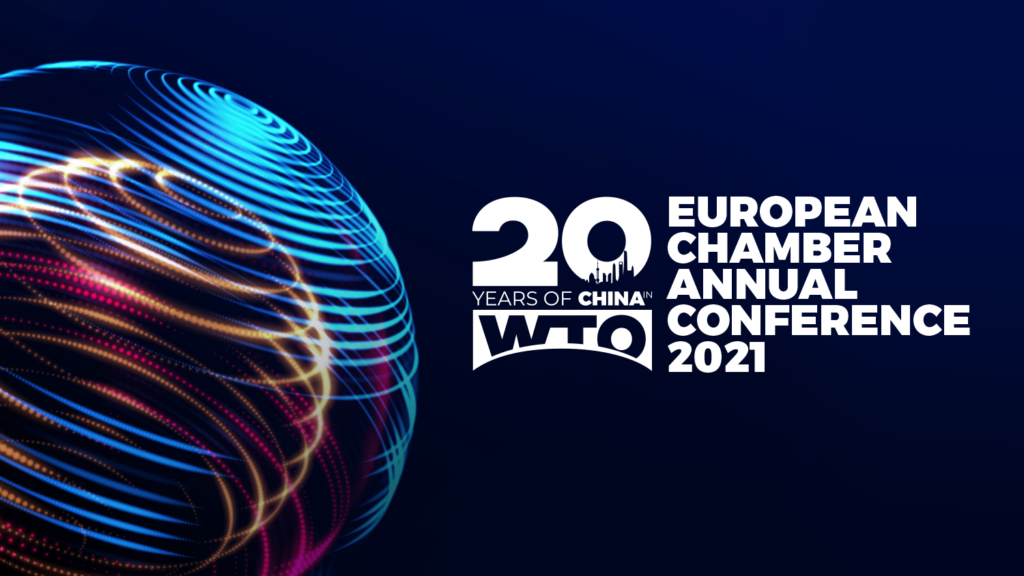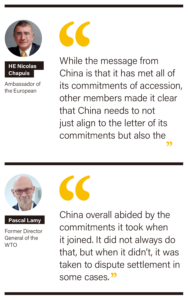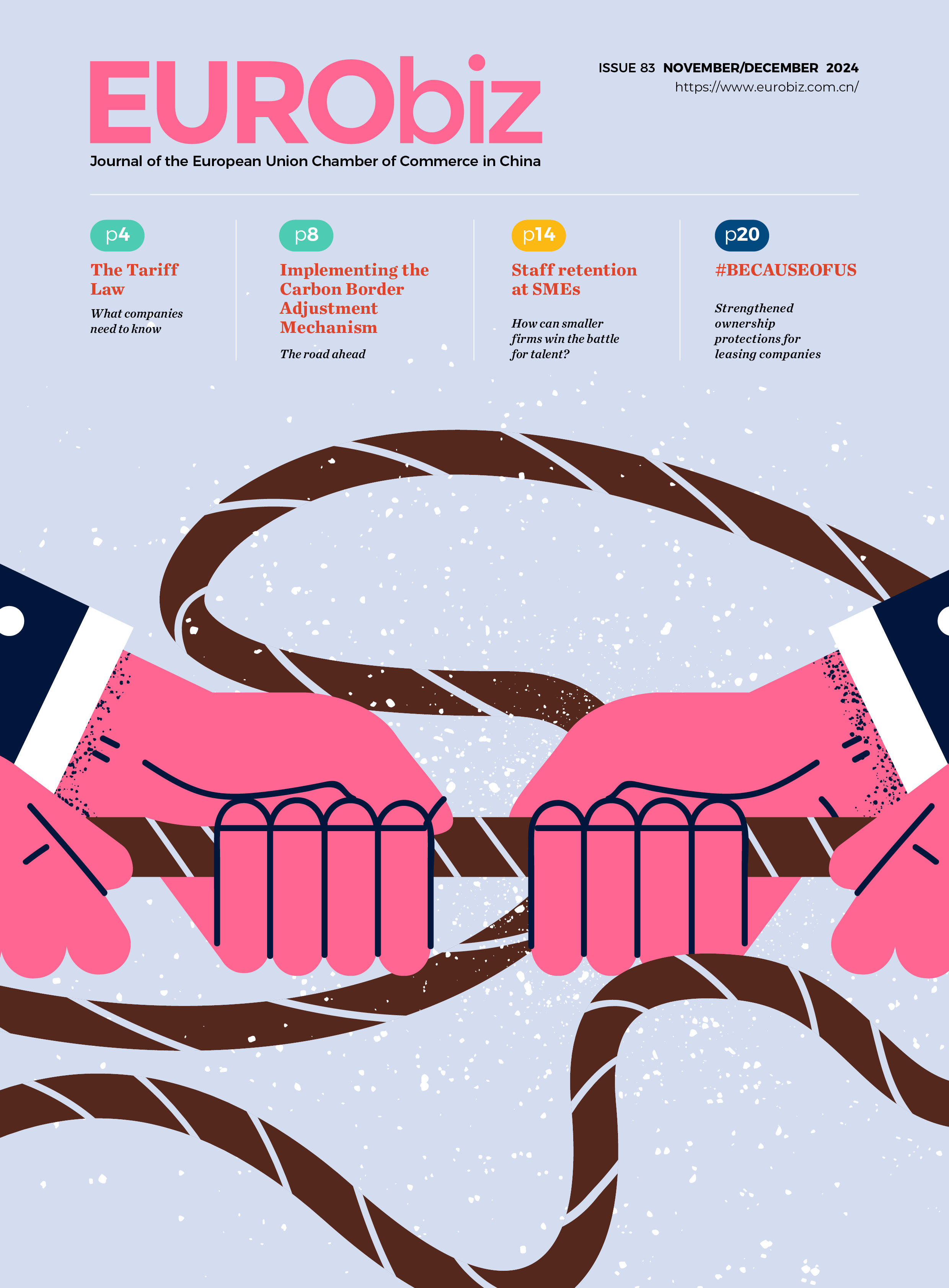
The European Chamber Annual Conference 2021
The European Chamber held its annual conference in Beijing on 9th December, themed ’20 Years of China in the WTO’. As Chamber President Jörg Wuttke said in his opening address, the 20th anniversary of China joining the World Trade Organization (WTO) is very significant to the Chamber, which was created partly to monitor China’s adherence to its commitments. He said he remembered Pascal Lamy, then Commissioner for Trade of the European Commission and who went on to serve as secretary-general of the WTO from 2005 to 2013, saying how he wanted to meet with European business segments in China, not countries – hence the inspiration for the European Union Chamber of Commerce in China.

The first speaker of the evening was HE Nicolas Chapuis, the ambassador of the Delegation of the European Union (EU) to China. Ambassador Chapuis noted that 20 years ago, when he was the French consulate general in Shanghai, he received multiple delegates from France every week, all of whom were astounded at the scale of development underway in China. He added that now the question is whether China will stay in the WTO. The ambassador also mentioned China’s recent trade policy review at the WTO, saying that while the message from China is that it has met all of its commitments of accession, other members made it clear that China needs to not just align to the letter of its commitments but also the spirit of accession in 2001.
Following the ambassador’s address, President Wuttke introduced Mr Lamy himself as the keynote speaker, who addressed the conference by video from Paris. Mr Lamy said that overall he felt China had abided by its accession commitments. Where it did not, it was dealt with through the dispute arbitration courts, or the issues concerned areas on which the WTO rule book was weak. Mr Lamy acknowledged that the WTO needs to reform in some areas, such as digital trade, but that China should be involved in the process. He noted that the United States (US) has withdrawn from engagement in this reform and and called on both the EU and China to work on getting the US re-engaged. He said: “For [reform] to happen, we need the big players to go back to the table.”

Another major figure in the negotiations on China’s accession was Charlene Barshefsky, who was the US Trade Representative in 2001. She also participated digitally in the Chamber’s Annual Conference, though, due to time-zone difficulties, in a pre-recorded video interview with President Wuttke. Ms Barshefsky praised Premier Zhu Rongji for the role he played in getting the deal on China’s accession over the line, saying his “intellect and foresight were the critical driving” factors in reassuring the Chinese side of the potential benefits of WTO membership. She went on to expresse her belief that the 2007/8 economic crisis had a major impact on China’s trust in the market economy system, saying there was “no question that the US financial meltdown, which became a global financial meltdown, demonstrated […] that the US had mismanaged economically its own economy, and to a large part, the global economy”. She said that the economic crisis led to such instability in the US that it increased China’s mistrust in the market economy model, and the subsequent withdrawal of the US from the global economy helped to cement a system in China that was antithetical to the market-based norm.
The conference also featured two panels, the first of which focussed on ‘20 Years of the WTO: China and the WTO’, covering topics such as China’s implementation of its accession commitments and how China joining the WTO has impacted the global trade system. One panellist compared China’s membership of the WTO to a marriage: in the beginning, both sides are infatuated and everything seems perfect, but when the seven-year itch sets in (the 2007/8 economic crisis), little things about the other side become annoying, but as these differences are not irreconcilable, the relationship can endure if both sides make the effort. All panellists agreed that WTO membership was a major factor in China’s economic development as well as global economic growth, while the arrival of foreign enterprises in the Chinese market led to the improvement of the regulatory framework and the business environment. There was some disagreement on the degree to which China had fulfilled its commitments, with the 900 recommendations in the Chamber’s Position Paper 2021/2022 held up as an indication that difficulties remained in many areas.
The second panel was themed ‘WTO Reform: Revitalising the Multilateral Trading Mechanism’, and looked at the need for changes to the WTO—bearing in mind the challenges the global economic landscape is undergoing, due to the rise of unilateralism and protectionism, and the lasting impact of the pandemic—and China’s potential role in this reform. There was a general consensus that the current situation with the WTO was unsustainable – with the dispute court hobbled and the apparent unwillingness of the US to re-engage and amend the system. In addition, rapid technological advancements over the past two decades have transformed trade and economies, meaning that the WTO rule book does not cover, or is weak on, many aspects of e-commerce and digital services/trade. The question of whether plurilateral trade agreements, such as the Regional Comprehensive Economic Partnership, would further de-establish the authority of the WTO was raised. While some panellists said the lack of reform to the WTO made such agreements necessary, others proposed that wide-ranging plurilateral agreements could in fact assist in resolving issues that were currently blocking reform of the WTO.
To bring the conference to a conclusion, European Chamber Secretary General (SG) Adam Dunnett gave a quick summary of the event’s main points of the speeches and panel discussions. He noted that when European businesses talk about challenges they face in China, they are often the same issues as 20 years ago, such as forced technology transfers, negative lists and inadequate intellectual property protection, among others. SG Dunnett urged businesses to continue to speak up about such challenges through the Chamber’s working groups and publications such as the Position Paper in order to maintain pressure on such market access barriers.


Recent Comments